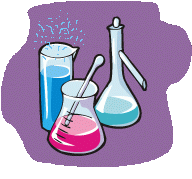


Description of experiment
Below follows a plain text transcript of the selected experiment.
![]()
Needed compounds:
-----------------
oxygen : O2
hydrogen : H2
Class:
------
elem=H,O
redox
Summary:
--------
A mixture of hydrogen and oxygen explodes on ignition, even when the mix
is not confined to a limited space.
Description:
------------
Prepare some hydrogen in a small bottle (25 ml) by adding some Mg powder or
turnings to 5 ml of dilute hydrochloric acid (appr.10% HCl by weight) and
immediately loosely stoppering the small bottle. As soon as evolution of
gas stops, stopper the bottle tightly.
(An alternative way of producing H2 at a high rate is as follows):
Dissolve some CuSO4.5H2O in 15% HCl. Add some aluminium household foil to this
solution and immediately stopper the bottle loosely. Be careful, the reaction
is very violent!
Prepare some oxygen by taking 5 ml of 3% H2O2 and add a spatula full of MnO2
or KMnO4 to this and immediately stopper the bottle. Do this in a small
bottle of 25 ml. This gives a brown liquid with almost pure oxygen above it.
Next, under water, bubble 2 parts of hydrogen gas from the H2-bottle and 1
part of oxygen from the O2-bottle into a single bottle. Estimate the ratio
as accurate as possible.
Now, you have a bottle with some water in it and the gas mixture above it
is a 2 : 1 mixture of H2 and O2.
Take a sink, full of water, with some bath foam or dish washing soap in it.
Check whether nice bubbles can be formed at the surface by bubbling some
air in the water. If this is the case, then proceed with the H2-O2 mixture.
Bubble a few ml of the H2-O2 mixture from the bottle and light the bubbles
at the surface of the liquid with a cigarette lighter. This gives a
remarkably powerfull BOOM!
Be careful: The sound of the explosions is REALLY loud. Do not use more than
a few ml of H2-O2 mixture at once, otherwise you may have permanent damage
to your ears, especially if the experiment is done in a smaller room!
![]()